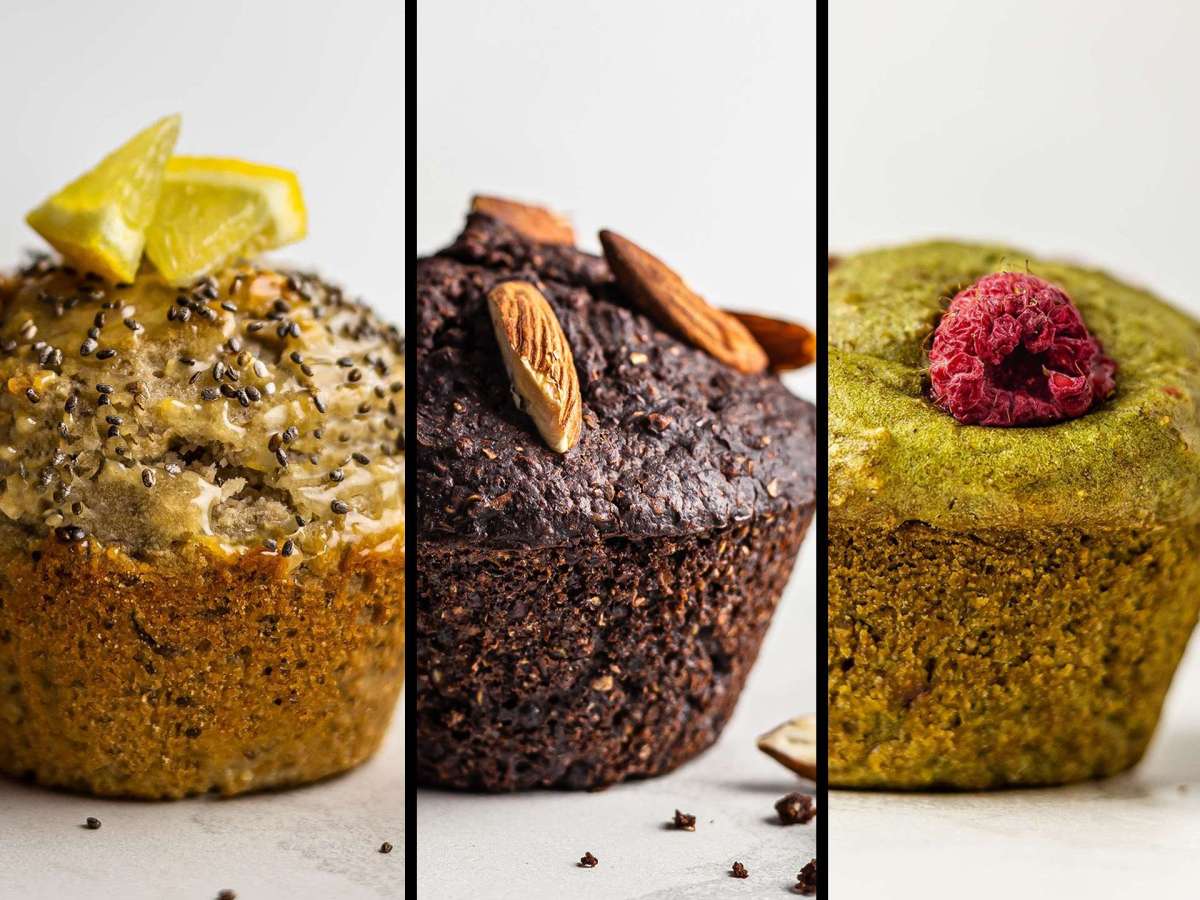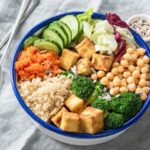Imagine a breakfast so versatile it caters to both vegetarian and flexitarian lifestyles, bursting with flavor and nutritional goodness. This isn’t just a collection of recipes; it’s a journey into the delightful world of savory and sweet breakfast muffins, crafted with adaptability and deliciousness in mind. We’ll explore a spectrum of recipes, from hearty vegetarian options packed with vegetables and protein to subtly meat-enhanced flexitarian variations that add a new dimension of taste. Prepare to be inspired by the creative ingredient swaps, stunning presentation ideas, and the sheer satisfaction of creating a breakfast that’s both healthy and incredibly appealing.
This comprehensive guide will equip you with the knowledge and skills to create a range of breakfast muffins to suit diverse palates and dietary needs. From understanding the nutritional benefits of each ingredient to mastering the art of plating for maximum visual impact, we’ll cover every aspect of the process, ensuring that even novice bakers can achieve delicious results. Get ready to elevate your breakfast game!
Recipe Variations

Vegetarian breakfast muffins offer a delightful and versatile way to start the day, catering to various tastes and dietary needs. These recipes showcase the adaptability of this breakfast staple, allowing for creative exploration of flavors and textures. The following recipes provide a balanced blend of nutrients, ensuring a satisfying and healthy meal.
Savory Spinach and Feta Muffins
These savory muffins burst with the vibrant flavor of spinach and the salty tang of feta cheese. The addition of herbs elevates the taste profile, creating a sophisticated yet simple breakfast option.
Ingredients: 1 cup whole wheat flour, 1 tsp baking powder, ½ tsp baking soda, ¼ tsp salt, 1 cup milk (dairy or non-dairy), 1 large egg (or flax egg), 2 tbsp olive oil, 1 cup chopped fresh spinach, ½ cup crumbled feta cheese, 1 tbsp chopped fresh dill, 1 tbsp chopped fresh chives.
Instructions: Preheat oven to 400°F (200°C). Combine dry ingredients in a bowl. In a separate bowl, whisk together wet ingredients. Gently fold wet ingredients into dry ingredients. Stir in spinach, feta, dill, and chives. Fill muffin tins ¾ full. Bake for 15-20 minutes, or until a toothpick inserted into the center comes out clean. Let cool slightly before serving.
Nutritional Benefits: These muffins are rich in iron and calcium from the spinach and feta, providing essential nutrients for energy and bone health. The whole wheat flour contributes to fiber intake, promoting digestive health. The olive oil adds healthy fats.
Sweet Blueberry Lemon Poppy Seed Muffins
These muffins offer a delightful balance of sweet and tart flavors. The bright citrus notes of lemon complement the juicy sweetness of blueberries, creating a refreshing and invigorating breakfast treat. The poppy seeds add a subtle crunch and visual appeal.
Ingredients: 1 ½ cups all-purpose flour, 1 tsp baking powder, ½ tsp baking soda, ¼ tsp salt, ½ cup granulated sugar, ¼ cup packed brown sugar, 1 tsp lemon zest, 1 tbsp lemon juice, ½ cup milk (dairy or non-dairy), 1 large egg (or flax egg), ¼ cup melted unsalted butter, 1 cup fresh or frozen blueberries, 1 tbsp poppy seeds.
Instructions: Preheat oven to 375°F (190°C). Combine dry ingredients in a bowl. In a separate bowl, whisk together wet ingredients. Gently fold wet ingredients into dry ingredients. Stir in blueberries and poppy seeds. Fill muffin tins ¾ full. Bake for 18-20 minutes, or until a toothpick inserted into the center comes out clean. Let cool slightly before serving.
Nutritional Benefits: Blueberries are packed with antioxidants, offering numerous health benefits. The lemon adds vitamin C, boosting the immune system. The whole grains contribute to fiber intake. The addition of butter provides healthy fats and adds to the richness of the muffin.
Spicy Black Bean and Corn Muffins
These muffins offer a bold and savory experience with a kick of spice. The combination of black beans, corn, and chili powder creates a flavorful and satisfying breakfast that is both hearty and healthy.
Ingredients: 1 cup whole wheat flour, 1 tsp baking powder, ½ tsp baking soda, ¼ tsp salt, ½ tsp chili powder, ¼ tsp cumin, ¼ tsp cayenne pepper (optional), 1 (15-ounce) can black beans, rinsed and drained, 1 cup frozen corn, ½ cup chopped red bell pepper, ½ cup milk (dairy or non-dairy), 1 large egg (or flax egg), 2 tbsp olive oil.
Instructions: Preheat oven to 400°F (200°C). Combine dry ingredients in a bowl. In a separate bowl, mash black beans slightly. Combine mashed beans with corn, red bell pepper, and wet ingredients. Gently fold wet ingredients into dry ingredients. Fill muffin tins ¾ full. Bake for 20-25 minutes, or until a toothpick inserted into the center comes out clean. Let cool slightly before serving.
Nutritional Benefits: Black beans are an excellent source of protein and fiber, contributing to satiety and digestive health. Corn provides vitamins and minerals. The chili powder and cumin add antioxidants and contribute to the overall flavor profile. The olive oil adds healthy fats.
Recipe Comparison
| Recipe Name | Key Ingredients | Flavor Profile | Dietary Notes |
|---|---|---|---|
| Savory Spinach and Feta Muffins | Spinach, Feta Cheese, Herbs | Savory | Vegetarian, can be made vegan with flax egg and non-dairy milk |
| Sweet Blueberry Lemon Poppy Seed Muffins | Blueberries, Lemon, Poppy Seeds | Sweet and Tart | Vegetarian, can be made vegan with flax egg and non-dairy milk |
| Spicy Black Bean and Corn Muffins | Black Beans, Corn, Chili Powder | Spicy and Savory | Vegetarian, can be made vegan with flax egg and non-dairy milk |
Flexitarian Adaptations
These vegetarian breakfast muffins offer a delicious and nutritious start to the day, but we can easily adapt them to suit flexitarian diets, incorporating small amounts of high-quality protein from animal sources for a more complete nutritional profile and exciting flavor variations. The following adaptations demonstrate how easily a few additions can transform these muffins into satisfying meals for those who occasionally include meat or seafood in their diets.
Savory Sausage and Cheddar Muffins
These muffins add a savory twist to the original recipe. Imagine the warm, comforting aroma of savory sausage mingling with the subtle tang of cheddar cheese. The addition of sausage enhances the protein content and adds a rich, umami depth to the flavor profile.
- Preparation: Start with your favorite vegetarian muffin recipe. Brown 1/4 cup of cooked sausage (Italian sausage works well, crumbled) in a pan before incorporating it into the batter along with 1/4 cup of shredded cheddar cheese.
- Incorporation: Gently fold the crumbled sausage and cheese into the batter, ensuring even distribution. Be careful not to overmix, as this can lead to tough muffins.
- Baking: Bake according to the original recipe’s instructions. The sausage and cheese will add a slight increase to the baking time, perhaps an extra 5-10 minutes, depending on your oven. Check for doneness using a toothpick; it should come out clean.
- Nutritional Impact: The addition of sausage increases the protein and fat content, providing a more satiating muffin. The cheddar cheese contributes calcium and additional flavor.
Smoked Salmon and Dill Muffins
This variation offers a sophisticated and elegant breakfast option. Picture the delicate, smoky flavor of salmon intertwined with the bright, herbaceous notes of fresh dill, creating a delightful contrast of textures and tastes. The addition of salmon elevates the protein content and adds a luxurious touch.
- Preparation: Begin with your base vegetarian muffin recipe. Flake 1/4 cup of cooked smoked salmon and gently mix it with 1 tablespoon of chopped fresh dill.
- Incorporation: Gently fold the salmon and dill mixture into the batter, ensuring the salmon is evenly distributed throughout. Avoid overmixing.
- Baking: Bake as per the original recipe’s instructions. The moisture content of the salmon might slightly reduce the baking time, so keep an eye on them and check for doneness with a toothpick.
- Nutritional Impact: Smoked salmon adds a significant amount of protein and healthy omega-3 fatty acids, enhancing the nutritional value of the muffins. The dill contributes vitamins and antioxidants.
Bacon and Gruyere Muffins
This version provides a hearty and flavorful breakfast option. Imagine the crispy texture of bacon contrasting with the nutty, complex flavor of Gruyere cheese. The addition of bacon brings a savory richness, while the Gruyere adds a sophisticated depth.
- Preparation: Start with your preferred vegetarian muffin recipe. Cook 2-3 slices of bacon until crispy, then crumble it finely.
- Incorporation: Gently fold the crumbled bacon and 1/4 cup of grated Gruyere cheese into the batter. Ensure an even distribution of both ingredients.
- Baking: Bake according to the original recipe’s instructions. The bacon adds fat, which may slightly alter the baking time; monitor closely and check for doneness.
- Nutritional Impact: The addition of bacon significantly increases the fat and protein content, leading to a more filling and energy-rich muffin. Gruyere cheese adds calcium and a unique, complex flavor.
Ingredient Substitutions and Dietary Considerations
These breakfast muffins offer a delicious and versatile starting point for a healthy morning, but dietary needs and preferences vary widely. Understanding how to adapt these recipes for various allergies and dietary restrictions ensures everyone can enjoy a flavorful and nutritious start to their day. The following sections detail ingredient substitutions and adjustments for common allergens and popular dietary plans.
Gluten-Free Substitutions
Many individuals avoid gluten due to celiac disease or gluten sensitivity. Fortunately, adapting these recipes for a gluten-free diet is relatively straightforward. Substituting gluten-free flour blends for all-purpose flour maintains the muffins’ structure, though the texture might be slightly different.
- All-purpose flour: Substitute with a gluten-free all-purpose blend (e.g., Bob’s Red Mill 1-to-1 Gluten Free Baking Flour). The texture may be slightly denser but will still hold its shape. The taste will remain largely unchanged.
- Oats (if used): Ensure your oats are certified gluten-free to avoid cross-contamination.
Dairy-Free Substitutions
Dairy allergies are common, and several dairy-free alternatives can successfully replace milk and yogurt in these recipes. The impact on taste and texture will depend on the chosen substitute.
- Milk: Unsweetened almond milk, soy milk, oat milk, or coconut milk can all be used as substitutes. Almond milk often results in a slightly sweeter muffin, while coconut milk can add a subtle coconut flavor. The texture might be slightly altered, potentially becoming slightly drier or moister depending on the milk’s fat content.
- Yogurt: Dairy-free yogurts made from soy, coconut, almond, or cashew are readily available. These will change the flavor profile subtly, introducing a slight nuttiness or coconut flavor depending on the type used. The texture will remain relatively consistent.
Nut-Free Substitutions
Nut allergies are serious and require careful attention. If nuts are used as an ingredient (e.g., in nut butters or as toppings), they must be replaced with suitable alternatives.
- Nut butters: Sunflower seed butter, pumpkin seed butter, or tahini can replace nut butters. These will impart different flavor profiles – sunflower seed butter is slightly sweet, pumpkin seed butter is mild, and tahini has a distinctive savory flavor. The texture might be slightly less creamy.
- Nut toppings: Sunflower seeds, pumpkin seeds, or even chopped coconut can replace nut toppings for added texture and visual appeal.
Vegan Adaptations
Creating vegan versions of these muffins requires replacing all animal products. This often involves careful selection of ingredients to ensure both taste and texture are maintained.
- Replace eggs with flax eggs (1 tablespoon flaxseed meal mixed with 3 tablespoons water per egg) or applesauce. Flax eggs provide a slightly nutty flavor, while applesauce adds moisture and sweetness. The texture may be slightly different depending on the replacement chosen.
- Replace dairy products as described above using plant-based alternatives.
- Ensure all other ingredients are vegan-friendly; many commercially available baking powders and extracts contain animal products.
Paleo Adaptations
Paleo diets focus on whole, unprocessed foods. This requires careful ingredient selection to exclude grains, legumes, and refined sugars.
- Replace all-purpose flour with almond flour or coconut flour. Almond flour produces a slightly denser muffin, while coconut flour requires more liquid and can result in a drier texture. Both will alter the flavor profile subtly.
- Replace sugar with a paleo-friendly sweetener like maple syrup or honey (in moderation).
- Ensure all other ingredients align with paleo guidelines.
Keto Adaptations
Ketogenic diets are low-carbohydrate, high-fat diets. Adapting these recipes requires reducing carbohydrate content significantly while increasing healthy fats.
- Replace all-purpose flour with almond flour or coconut flour (as in the paleo adaptation).
- Reduce or eliminate added sugar completely, relying instead on the natural sweetness of ingredients.
- Increase the fat content by adding more healthy fats such as avocado oil or coconut oil. This will affect the texture and make the muffins richer.
- Consider adding ingredients such as cheese or cream cheese for added fat and flavor (if not dairy-free).
Step-by-Step Recipe Creation
This recipe provides a detailed guide to creating both vegetarian and flexitarian breakfast muffins, perfect for a quick and nutritious start to the day. The process is designed to be straightforward, even for beginner bakers, with clear instructions and troubleshooting tips incorporated throughout. Remember to preheat your oven to 375°F (190°C) before beginning.
Ingredients
These ingredients will yield approximately 12 standard-sized muffins. Accurate measurements are crucial for achieving the desired texture and taste. Using a kitchen scale for dry ingredients is recommended for precision.
- 1 ½ cups (190g) all-purpose flour
- 1 teaspoon baking powder
- ½ teaspoon baking soda
- ¼ teaspoon salt
- 1 teaspoon ground cinnamon
- ½ cup (100g) granulated sugar
- 1 cup (240ml) unsweetened applesauce
- ½ cup (120ml) milk (dairy or non-dairy)
- 1 large egg (or flax egg for vegan option: 1 tbsp flaxseed meal + 3 tbsp water)
- ½ cup (60g) chopped nuts (optional, walnuts or pecans recommended)
- ½ cup (75g) dried cranberries or blueberries (optional)
- Optional Flexitarian Additions: ½ cup cooked crumbled bacon or sausage
Step-by-Step Instructions
The following steps Artikel the muffin-making process, emphasizing the importance of each stage for optimal results. Careful attention to detail will ensure perfectly baked muffins every time.
- Preheat and Prepare: Preheat your oven to 375°F (190°C). Line a 12-cup muffin tin with paper liners or grease the tin well. This prevents sticking and ensures easy removal of the muffins. Failure to properly prepare the tin can lead to burnt or stuck muffins.
- Dry Ingredients: In a large bowl, whisk together the flour, baking powder, baking soda, salt, and cinnamon. Thorough mixing ensures even leavening throughout the muffins. Lumps of baking powder or soda can result in uneven rising.
- Wet Ingredients: In a separate bowl, combine the applesauce, milk, and egg (or flax egg). Whisk until well blended. The applesauce provides moisture and sweetness, while the egg acts as a binder. Using a flax egg creates a vegan alternative.
- Combine Wet and Dry: Gently pour the wet ingredients into the dry ingredients and stir until just combined. Overmixing can result in tough muffins. The batter should be slightly lumpy.
- Add Mix-ins: Fold in the nuts (if using), dried cranberries or blueberries (if using), and any flexitarian additions (bacon or sausage). Gentle folding preserves the texture of the add-ins.
- Fill Muffin Cups: Fill each muffin cup about ¾ full. Overfilling will cause the muffins to overflow and potentially burn.
- Bake: Bake for 18-22 minutes, or until a toothpick inserted into the center comes out clean. Baking time may vary depending on your oven. Start checking for doneness around the 18-minute mark.
- Cool: Let the muffins cool in the tin for a few minutes before transferring them to a wire rack to cool completely. This prevents them from becoming soggy.
Troubleshooting
Addressing common baking issues ensures consistently delicious results.
- Muffins are too dry: This could be due to insufficient wet ingredients or overbaking. Next time, add a tablespoon more of milk or applesauce. Reduce baking time by a couple of minutes.
- Muffins are too gummy: This often indicates underbaking or too much wet ingredients. Increase baking time and/or reduce the amount of liquid next time.
- Muffins have sunk in the middle: This might be caused by insufficient baking powder or baking soda, or opening the oven door too early during baking. Ensure you are using fresh leavening agents and avoid peeking too frequently.
From the vibrant colors of a perfectly plated sun-dried tomato and spinach muffin to the comforting warmth of a cheesy, savory option, these vegetarian and flexitarian breakfast muffins offer a delightful and adaptable way to start your day. This guide has provided not only delicious recipes but also the tools to customize them to your exact preferences, accommodating various dietary restrictions and preferences with ease. So, embrace the flexibility, experiment with flavors, and savor the delicious rewards of creating your own personalized breakfast masterpiece. The possibilities are as endless as your imagination!
FAQ Guide
Can I make these muffins ahead of time?
Absolutely! These muffins store well in an airtight container in the refrigerator for up to 3 days or can be frozen for longer storage.
What’s the best way to reheat the muffins?
Reheat gently in the microwave or oven for optimal texture. Avoid over-heating, which can dry them out.
Are these muffins suitable for meal prepping?
Yes! They’re perfect for meal prepping as a grab-and-go breakfast or snack option throughout the week.
Can I use different types of cheese in the recipes?
Certainly! Feel free to experiment with your favorite cheeses. Cheddar, Monterey Jack, and feta all work well.


